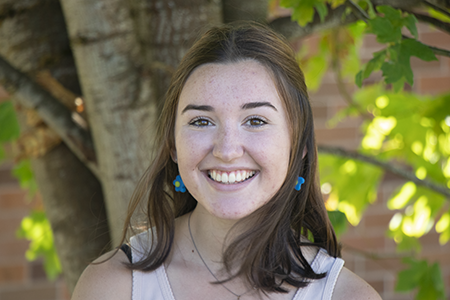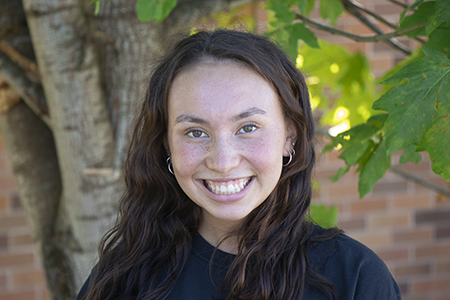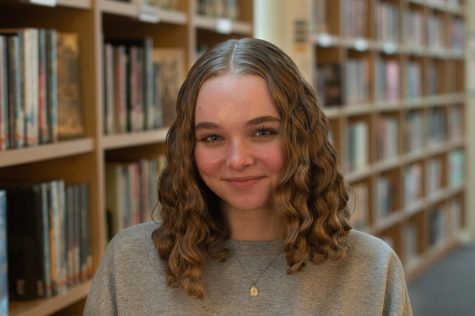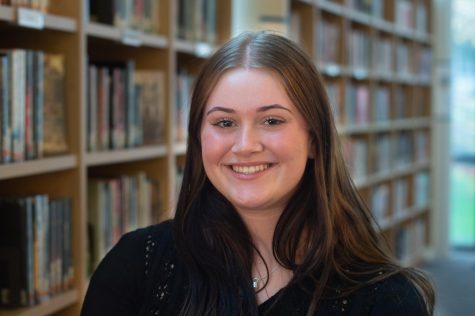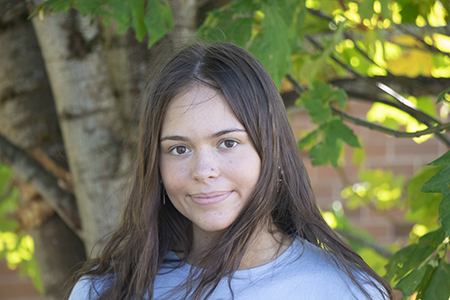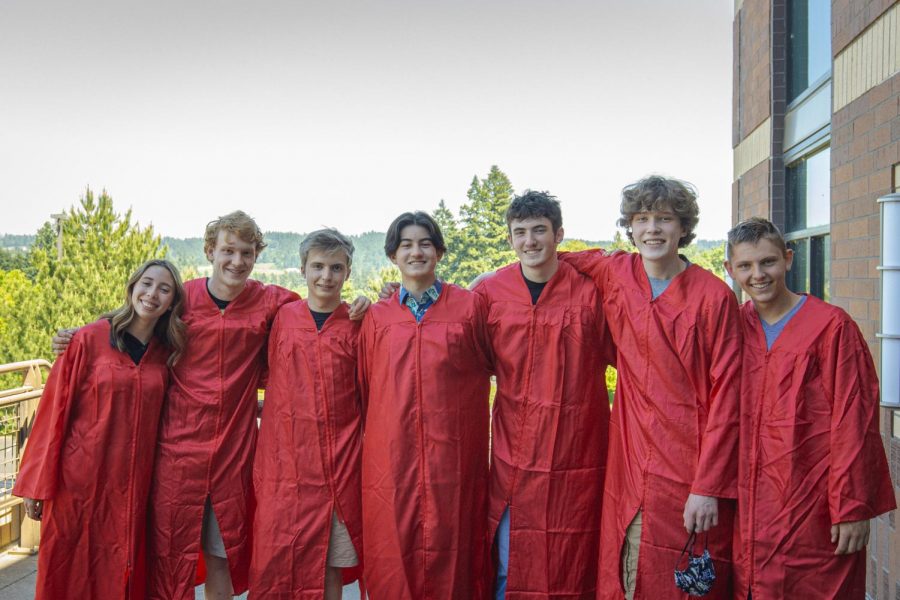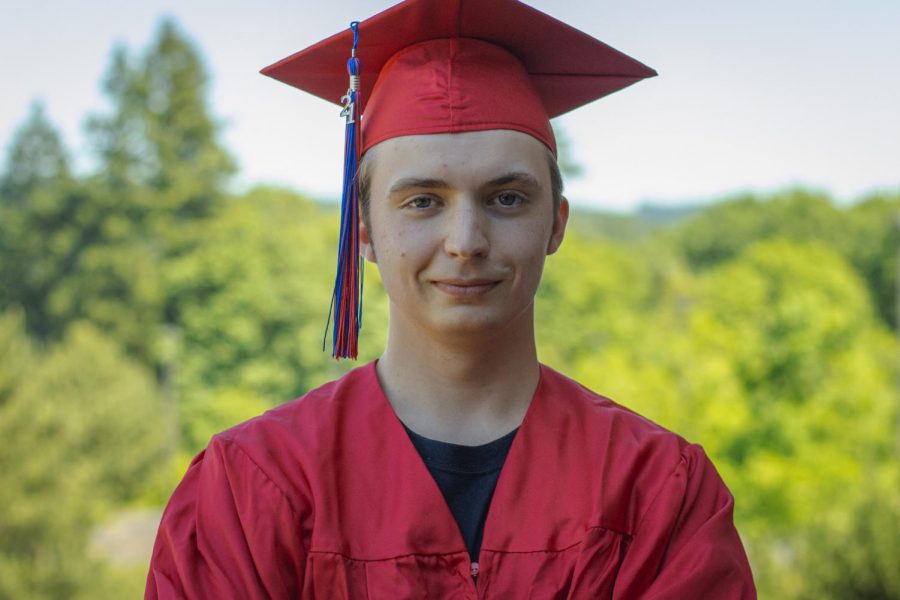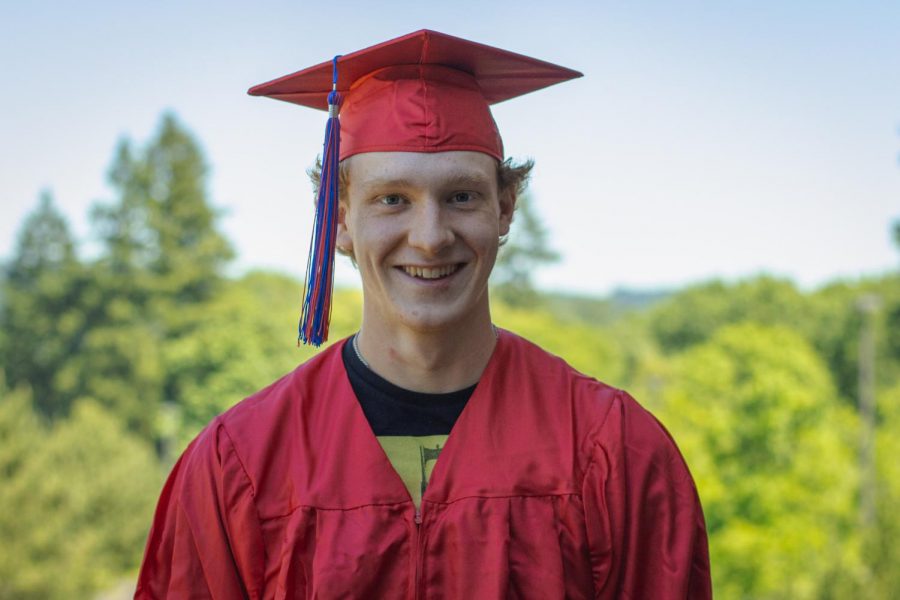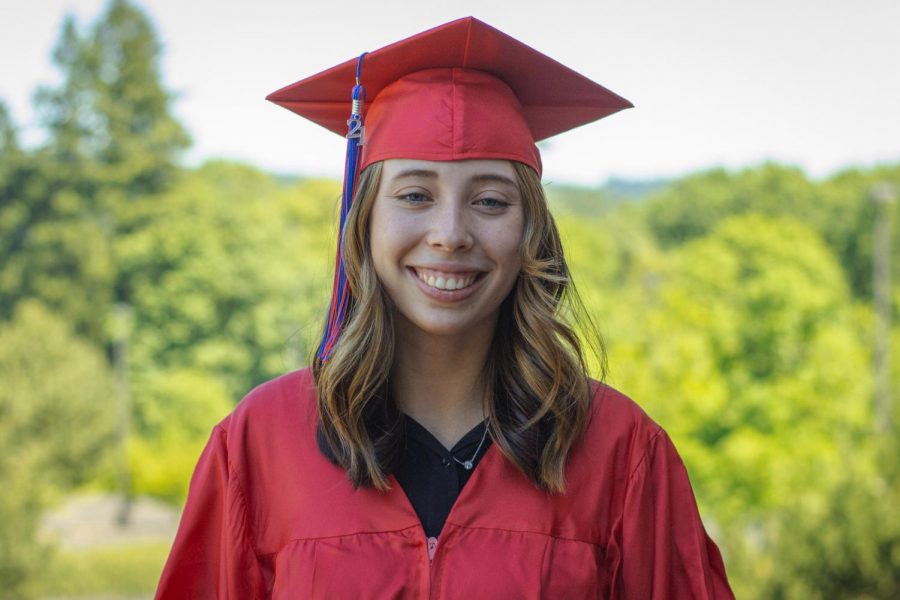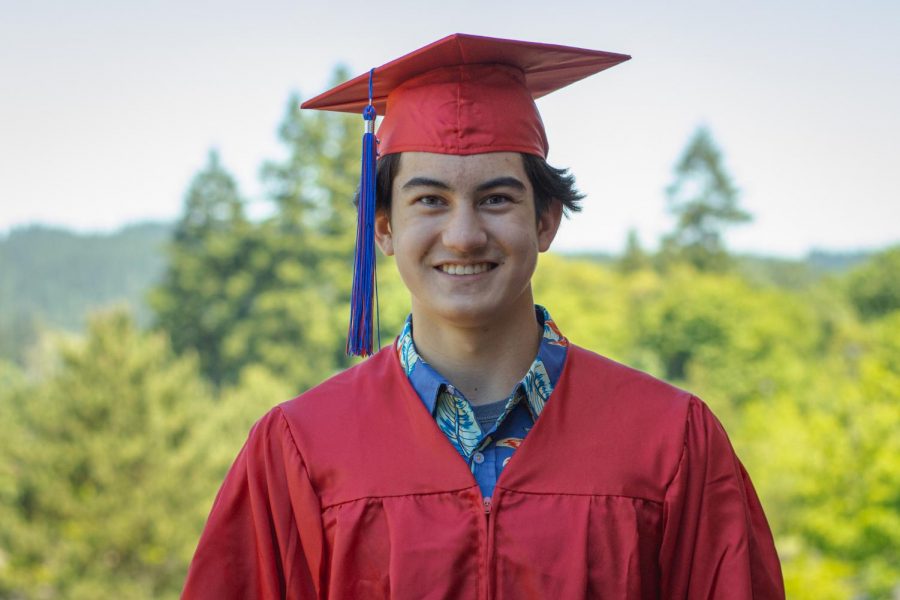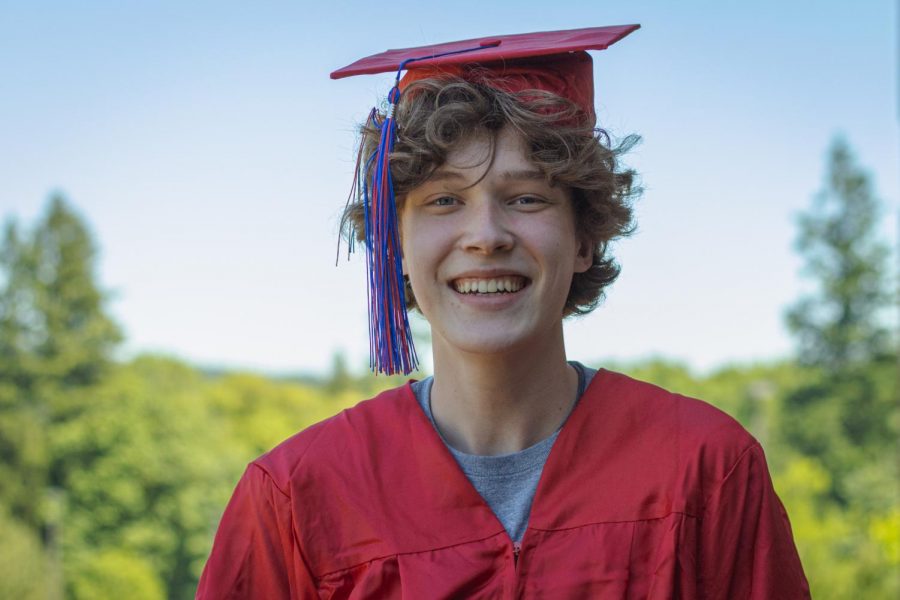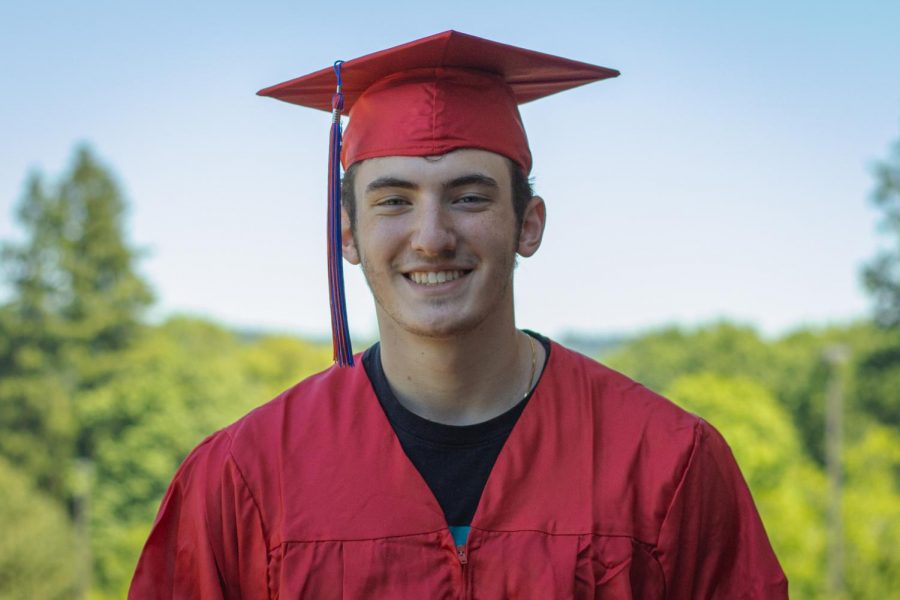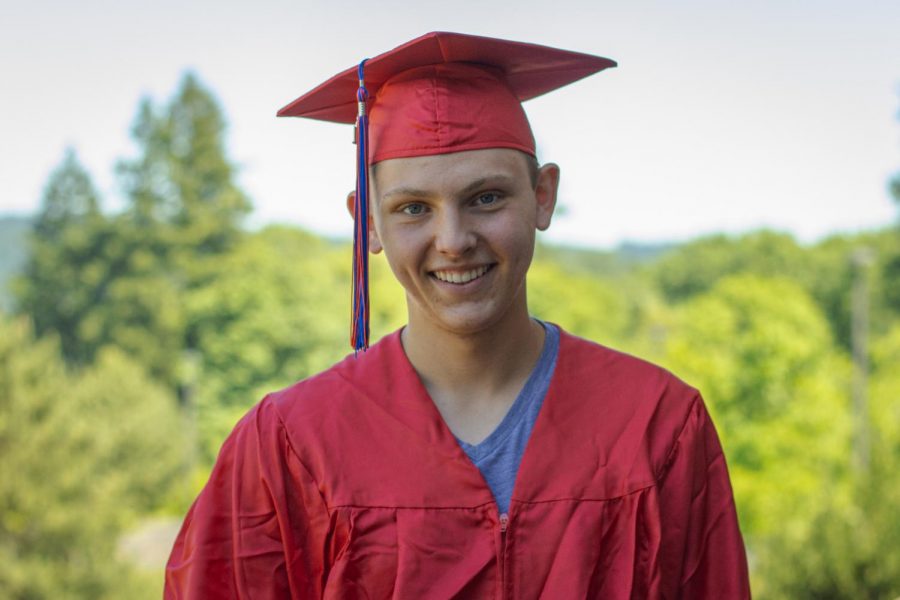Four years ago, Ryan Rosumny didn’t attend La Salle — he went to Union High School in Camas, Washington where he devoted his time to academics, athletics, and friendships. While he still spends most days focused on these aspects of life, Rosumny has since transferred schools, finding academic success at La Salle and being named salutatorian.
Rosumny had a memorable experience at Union, which he referred to as a “big-time” school, up until the end of his sophomore year when he left.
“Before I transferred, I was having a great time in high school and it was really fun just because I went to school with all of my friends that I grew up with,” he said. “We all live really close to each other, which is kind of what is different about La Salle people — they’re everywhere.”
Rosumny’s initial decision to leave the friends he grew up with and a place where he found solace behind was driven by his dedication to football and his ties to Coach Aaron Hazel, who he grew familiar with through a program called Air One Football Academy.
“I always did this football training with Coach Hazel,” he said. “I loved him as a coach and I wanted to play for him… I didn’t really know anybody here at all, other than him.”
Although Rosumny had set his sights on a rejuvenating high school experience, entering an unfamiliar environment brought on a new set of challenges, which were especially difficult after leaving somewhere he had fit in with ease.
“It was hard — it still is kind of hard just because it’s hard to come into a school where everyone knows each other for a long time and nobody knows you,” he said. “It’s hard to just walk in there and be yourself and make friends.”
Now, Rosumny is satisfied with the experience he had at La Salle due to the fact that he established new connections, made even more friends, and kept in touch with the old ones — all of which he said was a “win-win.” Rosumny also appreciates all that he learned, both in the classroom and on the football field.
“I’m really happy with it still because I ended up making a lot of friends that I would have never met,” he said. “I’m happy with the education, and the athletic experience was great — I wouldn’t have traded that for anything, I had a great time.”
On just the second day after Rosumny made the switch to La Salle, he was already offered a chance to bond with his teammates, as they were traveling to California for their first football game of the year. This is one of many moments from high school that he looks back on fondly.
Rosumny said that, as part of the journey, the team took a charter bus to Northern California, stopped at the University of Oregon along the way to explore the campus, and stayed overnight in a hotel to catch some rest before their game the next day. While they fell short in the game they played, Rosumny felt that this was an enjoyable way to begin his experience at La Salle.
“I knew the football players already, but I wasn’t super close with them yet just because I just got there,” he said. “That really helped me feel more comfortable with everyone and it kind of brought us all together, even though it wasn’t a win… It was [a] really good bonding moment.”
Rosumny also recalled the bittersweet cap to his high school football career when La Salle defeated Ridgeview High School.
“It was all of us seniors’ last high school game and it was just a really dramatic win,” he said. “It was a really close game and we won, and it just felt like a storybook ending.”
After the game, Rosumny said that he and his teammates sat themselves at the top row of the stadium bleachers and allowed the milestone to settle in.
“I’ll remember that forever just because,” he said, “we just embraced the whole moment and it felt really good.”
During his time at La Salle, Rosumny also immersed himself in the basketball program, where he played on the varsity team.
When Rosumny was a junior, they trekked to central Oregon for playoffs, and on the way, he recalled being crammed into a van with too little room to comfortably accommodate an entire basketball team. Rosumny said the experience was “insanely tight” and that there was “literally not enough width of the van for our shoulders to all fit.” However, he feels that this made the trip more memorable and even more difficult to forget.
“It wasn’t comfortable…, but it was like, if you’re going to be shoulder to shoulder with people for six hours, you’re definitely going to become closer over that — that’s just how it goes with sports,” he said. “I feel like you get put in these… situations with other people, and because of that, that’s how your bonds become so close.”
For Rosumny, football and basketball are highlights from his high school experience because they offered him “a platform to bond with a lot of people,” especially after discovering La Salle and during his search for belonging in a new community.
“Once you are super close with a group of people like that, it makes it that much more exciting to go be with them every day at practice and games,” he said. “There’s nothing better than playing a sporting event when you’re close with your teammates because you’re playing as a team and for each other… It’s just a really cool feeling that can’t really be matched anywhere else.”
However, managing a strict athletic schedule created a barrier for Rosumny, as he said that balancing homework and AP classes on top of his other commitments was not easy.
“It did definitely make it harder,” he said. “Sports are a big time commitment… You have practice and you have games and all that, but that’s like 1% of the time that I spend on sports. There’s so much more time spent lifting and going to the field.”
This year, Rosumny took four AP classes and has been allocating most of his free time to preparing for an athletic career at the collegiate level, which allowed him to focus on what matters to him most and cut out parts of his life that were not offering long-term benefits.
“It’s really hard to get everything done,” he said. “I found myself wasting a lot of time sometimes either on my phone looking at stuff that’s pointless or playing video games or going to parties that I’m not even enjoying that much anyways.”
To keep on top of his studies and athletic endeavors, Rosumny found that time management was a helpful skill.
“Whatever you prioritize is what you’re going to see results in,” he said. “I always prioritized football and school… That’s just kind of always been what I’ve done.”
Another fundament that allowed Rosumny to find success in the classroom simply had to do with finishing his tasks well and in an efficient manner, which he said required him to find the strength to persevere at times and a will to avoid the temptation of procrastination.
“I always just stayed on top of my assignments,” he said. “I never let myself get behind, which I think is really important in keeping your grades up just because once you get behind then it’s easier to lose motivation,” he said. “I always just took my grades really seriously and my classes. I wanted to try to get into a good college.”
The news of being named one of La Salle’s salutatorians came as a surprise to Rosumny. While he said that he recognizes the hard work he put into his accomplishments, he never thought about the honor throughout high school.
“It feels pretty good,” he said. “It’s like a pat-on-the-back kind of moment. I wasn’t really expecting it… It makes me happy because I’ve tried really hard in school.”
Rosumny credits his parents for being individuals to lean on leading up to this achievement. He said that he especially appreciates his father for sharing advice and support for all the sports he participated in, and his mom for pushing him to stay on top of his schoolwork.
“They’ve helped me over the years to become more self-sufficient in my time management,” he said.
Looking back on the last four years, Rosumny holds onto regret for skipping out on his last season of high school basketball, which he stepped away from to put a heavier emphasis on football. He also said that he wishes he would have been more outgoing in terms of making friends at La Salle.
“I’m graduating already and there are so many kids that I literally couldn’t even tell you their names,” he said. “I kind of regret that just because I didn’t really try as hard as I can to meet a lot of new people.”
Rosumny said that high school in general has shaped the individual he is today, as it has prepared him for life ahead. The banner “push your limits and prepare for life” is a value that he said will resonate with him beyond La Salle since the pressure of keeping on top of his responsibilities isn’t “going to end after high school.”
“It’s good to get that experience in high school and balance a lot of things and be stressed because it’s not going to get easier,” Rosumny said. “High school is not the peak of your life.”
Next year, Rosumny will attend Pomona College in Claremont, California, where he will not only work toward a degree but simultaneously play for the football team. Before heading off to college, he hopes that others at La Salle have a similar takeaway to his own.
“The most important thing that I took from high school was learning over time how to grow up and do stuff by yourself,” he said. “After high school, whether you’re going to college or not, life starts to get more independent… Not that you have to be independent in high school, but it’s teaching you the skills of how to — how to balance your time [and] how to balance a lot of things on your plate.”
In the fall of next year, Rosumny will study mathematics, and possibly economics as well, because recently, he’s found interest in following the stock market and economy as a whole.
“I’ve always been a math thinking person,” he said. “I kind of say that a lot when people ask me why I’m choosing economics, but I just feel like everyone’s brain works differently — the way they think about things… The way I think about things is a lot of times is in a math way, which is kind of weird, but that’s just the way I function. I feel like it’d be a good fit for me.”
Although Rosumny has yet to officially determine a specific career he wants to pursue, he is continuing to explore different options and plans to keep his window of opportunity open.
“I could get into finance where I could be a financial advisor and help other people with their money,” he said. “I could work for mutual funds and help allocate stocks to diversify people’s portfolios. I’ve looked into quantitative analysts, which is a really hard job to get, but they’re the ones working on Wall Street… There’s a lot of options — it’s hard for me to just say one right now.”
As Rosumny moves on from La Salle and onto continuing his education and football career at Pomona College, he hopes other students don’t make the same mistake he feels that he did before completing high school.
“Make friends with as many people as you can, which I wish I did more,” he said. “The more people you meet, the more connections you’ll have and the more memories you’ll make.”
